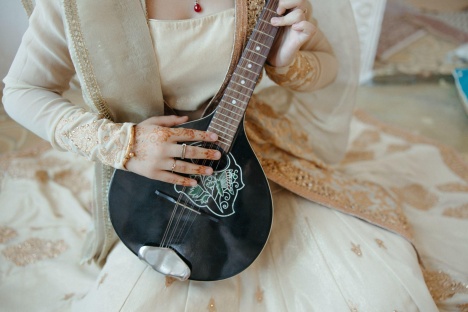
My Personality Stemmed from My Hobby
More often than not, the person you are today has strongly been influenced by the activities you participated in as a child. Just take a moment to reflect - what kind of things did you do when you were younger? Did you dabble in music or dance around your room? Or maybe you even spent your time doodling in your notebook? All of these things might have helped shaped your character of today.
Having a hobby as a child has been proven advantageous to the growth of the mind. Hobbies help develop many skills early on in life, skills that will later be useful in adulthood. They can prepare someone for the competitiveness of the world, creating in them excellent interpersonal skills as well as providing mental stability.
Here are some ways that participating in hobbies as a child can impact personality traits in adulthood:
- Builds confidence
Here's a scenario: You're giving a presentation at work. It's a proposal for the new project that has just been introduced and if you do well, you may get a promotion. You get up in front of coworkers, your boss, and executives to pitch your piece. A moment before you speak you think back to when you were younger, when you used to perform in theater productions in front of huge audiences. The first time you performed, you were a nervous wreck and stumbled over your words. But, eventually you grew accustomed to people watching you. Back in the present, you begin your presentation without any hesitation, not once fearing the people watching you. You speak with precision and impress everyone.
While confidence can be developed naturally, (as in you were born a super charismatic person), a majority of the time our confidence lies within the activities we partake in in our youth. At an early age, we are forced to overcome certain obstacles and having hobbies helped us to adapt to these situations. Through hobbies, we pushed our limits and were forced out of our comfort zones at such an early stage of life. You're able to be confident today because as a child whatever activity your participated in forced you to grow confident. It helped build your self-esteem, giving you something to succeed in that wasn't just academic based. You're bold today because as a child you were timid, and your hobby helped bring forth the confidence that was always lying within you.
- Creates an identity
You may be thinking that identity is just another way of saying personality or character. But, an identity goes deeper. It targets a person's sense of self, the core of their being. How someone views themselves, what their self-worth is, and so on. The identity exists so that things like confidence can flourish. Your identity is what has kept your personality the way it is or has been the reason for its change. If you see yourself as strong, then that will reflect in your character traits (maybe you're a good leader).
So naturally, hobbies help create your identity - who you identify as. Take the statement from above, for example. You master that new dance move you've been working on for so long. Because of this, you see this new quality in yourself - you see yourself as strong. You go on to become a CEO and lead a whole company. All because, as a child you saw yourself as strong and capable of doing anything through your successful dance move.
- Development of growing attributes
Growing attributes, as in, these are things that you are going to keep using for the rest of your life. Sure, hobbies help build actual skills in someone that can be used to develop a successful career (i.e if someone's hobby is computer coding, they can use that skill in an IT field). But the attributes being referred to here are the ones that can be used for every day tasks as well. Three in particular come to mind when thinking about how hobbies effect personality:
Patience, determination, and persistence.
By partaking in a hobby as a kid, you were able to develop the mentality that if you work hard enough a something, practicing and practicing until you master it, you have the power to achieve anything. These three skills will definitely carry with you for the rest of your life. One must have patience to wait out an outcome, determination to see that a task is adhered to and persistence to keep pushing through until the end.
You also learn the, 'If at first you don't succeed, try, try again,' mentality. As in, even if you don't accomplish something the first time around, you can always go back and do it again, this time learning from your mistakes. This is the character trait of persistence - where as if you were to just give up instead, you'd create a lousy personality trait in yourself.
- Forces habits, learning and goal-setting
One thing so many adults seem to struggle with is time management. They either lose track of time easily, forget things they are supposed to be doing, or overbook themselves. Having a hobby at a young age instills a sense of habitual routine. You have practice at the same time every week. You go over the same methods in order to get better. Things are consistent. This sense of consistency can easily flow into adulthood, creating an organized lifestyle instead of a chaotic one. In another sense, having a hobby as a child prevented you from wasting your time. You weren't able to create bad habits (varying from watching too much television to even smoking) because your time was consumed with productive activity.
Not to mention, the world can be a boring place if time is not spent properly. Boredom can lead to negative behaviors. Just think, if you didn't partake in a hobby as a child, what would you have been doing? Was there a chance that you could've gotten into trouble, starting hanging out with the wrong people? Maybe even do something as extreme as join a gang? Not saying that if you didn't have a hobby as a kid that you were a delinquent. But, in some cases this could be the truth. Having a hobby, especially something your were passionate about, would keep you out of trouble and prevent you from becoming lazy.
Hobbies help expand your learning capabilities as well. They help you retain new information needed to succeed, which in turn helps you become more attentive to other learning possibilities in your life. For instance, if you are able to pick up a new song quickly on the guitar that can easily translate to your ability to learn a new skill at work as an adult.
Then there is the idea that hobbies help teach children how to set goals for themselves. This ties into the skills discussed earlier (patience, determination, persistence). When trying a new hobby, unless you were a protégé, you aren't going to become a master after your first attempt. Say you wanted to start singing when you were younger, but you couldn't carry a note at all. Your pitch was all over the place and you didn't know how to breathe properly. You decide that every week you were going to learn something new about singing - one week would be breathing techniques, another week would be vocal range, etc. You've set goals for yourself to become better at something you want to be good at.
Goal setting is a very helpful characteristic for an adult - it helps in prioritizing tasks. So, as a child you focused on what was most important in learning singing first, then moved on. As an adult you make short term and long term goals - where you see yourself next week versus where you see your self in a month.
- Initiates thinking outside the box and helps with problem solving
As a child, we spend our time growing our brain whether it be through creative or logic based measures. One of these logic based measures that plays a major role in adulthood is problem solving. Focusing on one task for too long can be frustrating, especially if there doesn't seem to be an immediate solution. Mind flexibility is needed to help us overcome challenges. That's why, as a kid, if there is something you can't solve, they say to step away from it, do something else, and then go back to it. When we preoccupied ourselves with something else, we were actually using our brains more!
For example, say you were struggling with a math problem. No matter how many times you worked it out, the answer never surfaced. Eventually, you decide to take a break and go draw something in your sketchbook. After some time, you go back to the math problem and are suddenly able to realize the solution. This is because when you left the problem to attend to another activity, you were quite literally 'thinking outside the box'. Although drawing and math don't relate (as one is logic based while the other is creative based), you were able to solve the problem because you saw it from a different perspective.
- Allows you to take ownership and criticism
As a child you're constantly being controlled by the older people around you. You're told what to do and when to do it. But, taking on a hobby allows you to be the boss of your own little world. You've suddenly been given this power (albeit a miniscule amount) to make your own choices. You're now responsible for your actions. It is important to learn ownership at a young age because it helps contribute to someone's confidence level down the line. If you are willing to realize your actions and mistakes, you grow as a person. If at a small age you can find the will to continue pursuing your hobby, you've given yourself a leg up in the world of future motivation.
In youth, you are at the most vulnerable time of your life. You are easily offended, complain over the littlest of things, and make excuses for everything. You mess up again and again, each time receiving reprimandation from the adults in your life. You miss a lesson, you are scolded for your laziness. You forget to practice, you are scolded for your lack of caring. You make a mistake while playing the piano, your teacher provides constructive criticism. Sure, at the time you may feel disheartened and defeated, but receiving this criticism at a young age prepares you for a life filled with it in the future. As an adult, instead of breaking down into tears every time you do something wrong and someone tells you to do better, you instead lift your head high and move forward, learning from your mistakes.
- Promotes good mental health
Finally, having a hobby as a child helps promote good mental health early on. Hobbies put you in touch with your emotions, a complex thing that may children don't know how to express. Hobbies create a bridge from the mind to the heart, allowing children to convey themselves in ways often suppressed.
You use various parts of your brain while participating in hobbies. Not only this, but hobbies help keep the mind preoccupied, and can help form coping mechanisms for tragedy in a person's life.
Above all, hobbies create hormones like Serotonin in the brain. Meaning - they make you happy! If, as a child, you were enthusiastic about a hobby, you'd be eager to participate in it regularly. That very well may carry into the type of person you are today - excited for new things, looking at the bright side of a situation, finding the glass more half full than empty. You may have associated a certain hobby as the source of your happiness growing up and that now influences how you view the world.
Who could ever have imagined there could be so much connection between childhood hobbies and adult personality traits? It's simply amazing how our minds can use anything in our lives to develop us into the people we are today.
If you have a child, consider having them join a hobby - something they will come to love. At first, they might know what to pursue, but if you think of the long term advantages having one has, then allowing them to be picky is worth it.
And if you don't have children, try to picture your own lives. How has having a hobby as a child changed you? Do you think it's helped sculpt your character?


